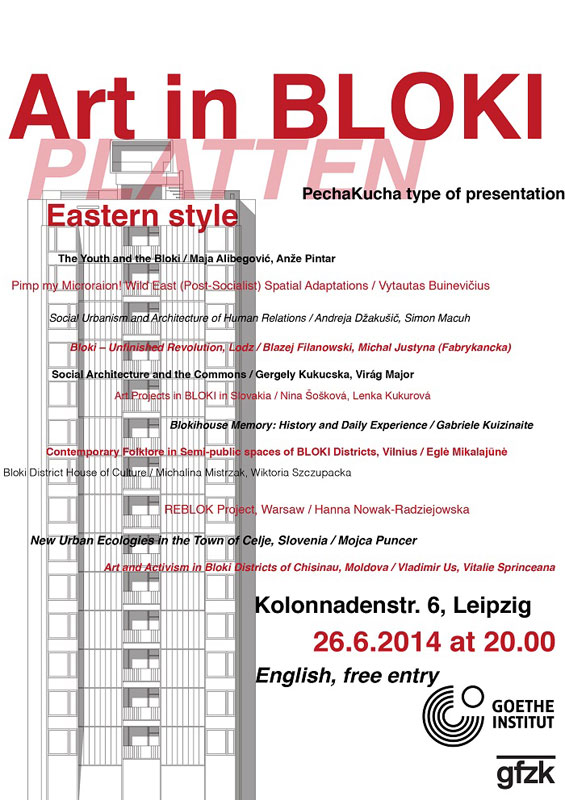BLOKI Seminar, Leipzig, 26-27 iunie 2014
BLOKI Seminar
26-27 Iunie 2014
Leipzig
BLOKI Seminar:
26.6., 20.00, Kolonnadenstraße 6, Leipzig
Art in Bloki (Platten), Eastern Style, Pecha Kucha type of presentation of diverse art projects in Bloki districts in Eastern Europe
in English, free entry
27.6., 17.00 – 20.30, Auditorium/Villa, GfZK
Panel discussion and presentations focused on themes related to Bloki in Eastern Europe
in English, free entry
BLOKI is an international collaborative art project dealing with questions around the (in)famous blocks of flats remnant of socialist times in the Eastern European countries. The curators envision to establish a critical platform between countries, disciplines and approaches, in oder to awaken citizen responsibility and to propose new possibilities of action for the blocks of flats, changing the view of the inhabitants on their own living space, as well as the general view on Bloki´s.
The curators of the project, coming from Lithuania, Poland, Slovakia, Hungary, Slovenia, Moldova and Germany wish to act both on the international and local level. On the international level by an extensive research and by bringing together the actors, practices and experiences of their respective countries, creating a pool of common knowledge on an interdisciplinary basis, to further the understanding of working with blocks of flats, and from this new understanding they propose to act on the local level, developing new, grass-root, responsible art projects, for the tangible and long-term benefit of the local population.
The project was initiated in 2013 with support of the Goethe-Institute. The event is organized in collaboration with the Goethe-Institute in Prague and GfZK Leipzig. Seminar is organized by Lenka Kukurová.
27.6., 17.00 – 20.30, Auditorium/Villa, GfZK
17.00 – 18.30
What’s Wrong with BLOKI? When Functionalism Stops Working
Idea of BLOKI comes from modernist city conceptions and ideological dreams about anti-hierarchical societies. In Central and Eastern Europe this conception was adopted by socialist governments in 60s as a cure for lack of flats achieving modern standard. Built hastily, sparingly, without participation of future inhabitants – BLOKI were recognized as a symbol of authoritarianism and unrealized promise of better life quality for everybody. Nowadays we can look at the BLOKI problem from historical perspective. What failed and what was adopted from this project in contemporary architecture? What can we do with this huge buildings resource? Is it possible to define weak points of BLOKI and try to fix them? What are responses of inhabitants to the BLOKI problems? How can social and political protest, supported and encouraged by activist and artistic communities contribute to the problem solving?
Speakers: Vytautas Buinevičius (LT), Blazej Filanowski (PL), Hanna Nowak-Radziejowska (PL), Vitalie Sprinceana (MD), Vladimir Us (MD)
19.00 – 20.30
Social Urban Green, Self-sustainability and Community Art as a New Utopia
All through history, gardens have been places for artistic and social imagination, an utopistic place where a better future was often hoped to be planted. The promise of mental, social and psychological liberation was and is widely associated with the garden, just think of historical examples as the Garden City Movement, the allotment garden (or Schreber Garten) success
and political struggles around parks and public green places – which continues today as well, (in for instance the famous Ghezi Park conflict), sustainable city idea, community garden and self-sustaining community projects, to garden art pieces. This discussion focuses on these new modalities of urbanist and artistic action around the garden and green in the urban tissue, especially in degraded urban areas as for instance the BLOKI districts. What are the characteristics and promises of these generally community-based, participatory initiatives and public art projects, and what new hopeful utopia can be nurtured on their ground? Can this utopia be brought up and realized?
Speakers: Hanna Nowak-Radziejowska (PL), Virág Major (HU), Andreja Džakušič (SI), Simon Macuh (SI), Mojca Puncer (SI)
More about the event here
Tags : Andreja Džakušič, Blazej Filanowski, BLOKI Seminar, GfZK Leipzig, Goethe-Institute in Prague, Hanna Nowak-Radziejowska, Lenka Kukurová, Mojca Puncer, Simon Macuh, Virág Major, vitalie sprinceana, Vladimir US, Vytautas Buinevičius
